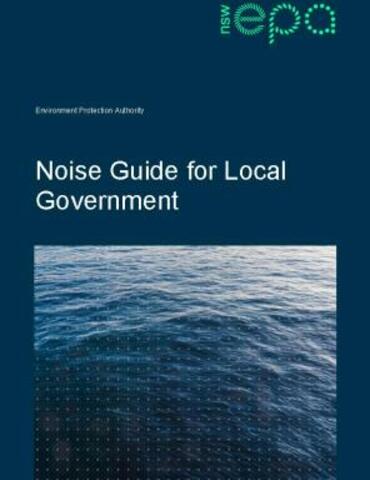Noise guide for local government
The Noise Guide for Local Government (PDF 3.3MB) provides practical advice for council officers on planning, assessing, managing and preventing local noise problems.
This is an update of the 2013 guide, based on feedback from stakeholders. It makes it easier for councils to find information on:
- the legislative framework for managing noise
- who is responsible for managing noise
- options for managing noise.
The guide has been designed primarily to meet the needs of councils. However, it may also be helpful for:
- government agencies responsible for managing noise in certain circumstances, for example NSW Police and Transport for NSW
- community members affected by noise seeking to understand who may be responsible for managing noise in specific circumstances and what regulatory (and non-regulatory) options are available to council (or other regulatory authorities) to resolve noise issues
- acoustic consultants who may be required to prepare noise assessments on behalf of council, or for a council-regulated activity.
The guide reflects changes introduced by the Protection of the Environment Operations (Noise Control) Regulation 2017 and other legislative changes made since 2013. It does not include changes introduced by the NSW Government’s Vibrancy Reforms in 2023 and 2024. These are detailed below.
Before finalising the document, we put it online for public consultation and have published a summary of the submissions we received.
Vibrancy Reforms
In 2023 the NSW Government introduced new, simplified rules for public entertainment activities, to help boost NSW’s night-time economy. These new rules, known as the Vibrancy Reforms, make it easier for local councils to host special events and establish entertainment and hospitality precincts within their local government area.
The Vibrancy Reforms are given force by the 24-Hour Economy Legislation Amendment (Vibrancy Reforms) Act 2023 and the 24-Hour Economy Legislation Amendment (Vibrancy Reforms) Act 2024. These Acts amend or override some provisions in other legislation, including some noise offences.
The Vibrancy Reforms introduced a new provision, Section 91A, to the Protection of the Environment Operations (General) Regulation 2022 (POEO General Regulation). This provision exempts liquor licensed premises, and premises within special entertainment precincts (SEPs) from enforcement measures under the Protection of the Environment Operations Act 1997 (POEO Act) for noise pollution and offensive noise. These enforcement measures include:
- prevention notices in Part 4.3, to the extent they relate to noise
- the operation of plant in section 139
- special noise provisions in Part 8.6, which includes noise control notices, noise abatement orders, directions and police powers.
Section 91A does not apply to noise from activities for which the NSW Environment Protection Authority (EPA) is the appropriate regulatory authority. These include:
- premises with an Environment Protection Licence under Schedule 1 of the POEO Act
- outdoor entertainment activities as prescribed under section 11 of the POEO General Regulation
- entertainment activities carried out by the State or public authority under section 12 of the POEO General Regulation.
Under s91A of the POEO General Regulation, when an entertainment activity is carried out at a liquor licensed premises, the premises is exempt from the specified noise enforcement measures contained in the POEO Act and POEO General Regulation. Instead of the POEO Act mechanisms, noise from entertainment activities at liquor licensed premises (including liquor-licensed vessels) is regulated under the Liquor Act 2007 by Liquor and Gaming NSW. It is primarily regulated through improvement notices, liquor licences, and a noise disturbance complaint framework.
Entertainment activities are activities which are carried out for the purposes of entertaining the public, such as live or recorded music, karaoke, trivia and comedy shows.
More information on regulating noise from liquor licensed premises can be found on the Liquor and Gaming website.
A SEP is a defined area in which noise from entertainment activities is regulated in accordance with a precinct management plan, which includes trading hours and a sound management framework.
In a SEP, both liquor licensed and unlicensed premises are exempt from noise enforcement measures under the POEO Act and POEO General Regulation, if they are operating in accordance with a precinct management plan. Noise conditions in a precinct management plan override any existing noise conditions for a premises, including those in a development consent, complying development, or liquor licence.
A precinct may be a single premises, a street, or other defined area. The regulatory framework for SEPs is prescribed in the Local Government Act 1993. Councils are required to notify existing and incoming residents of the precinct on their website, and on planning certificates.
The NSW Planning website provides more information, including guidelines to assist councils in establishing and managing special entertainment precincts, an acoustic toolkit, and other support tools.
Download

Noise Guide for Local Government Noise Guide for Local Government
